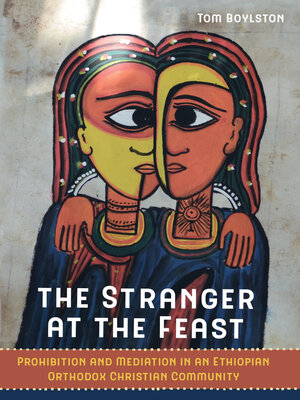The Stranger at the Feast
ebook ∣ Prohibition and Mediation in an Ethiopian Orthodox Christian Community · The Anthropology of Christianity
By Tom Boylston

Sign up to save your library
With an OverDrive account, you can save your favorite libraries for at-a-glance information about availability. Find out more about OverDrive accounts.
Find this title in Libby, the library reading app by OverDrive.



Search for a digital library with this title
Title found at these libraries:
| Library Name | Distance |
|---|---|
| Loading... |
At publication date, a free ebook version of this title will be available through Luminos, University of California Press's Open Access publishing program. Visit www.luminosoa.org to learn more.
The Stranger at the Feast is a pathbreaking ethnographic study of one of the world's oldest and least-understood religious traditions. Based on long-term ethnographic research on the Zege peninsula in northern Ethiopia, the author tells the story of how people have understood large-scale religious change by following local transformations in hospitality, ritual prohibition, and feeding practices. Ethiopia has undergone radical upheaval in the transition from the imperial era of Haile Selassie to the modern secular state, but the secularization of the state has been met with the widespread revival of popular religious practice. For Orthodox Christians in Zege, everything that matters about religion comes back to how one eats and fasts with others. Boylston shows how practices of feeding and avoidance have remained central even as their meaning and purpose has dramatically changed: from a means of marking class distinctions within Orthodox society, to a marker of the difference between Orthodox Christians and other religions within the contemporary Ethiopian state.
The Stranger at the Feast is a pathbreaking ethnographic study of one of the world's oldest and least-understood religious traditions. Based on long-term ethnographic research on the Zege peninsula in northern Ethiopia, the author tells the story of how people have understood large-scale religious change by following local transformations in hospitality, ritual prohibition, and feeding practices. Ethiopia has undergone radical upheaval in the transition from the imperial era of Haile Selassie to the modern secular state, but the secularization of the state has been met with the widespread revival of popular religious practice. For Orthodox Christians in Zege, everything that matters about religion comes back to how one eats and fasts with others. Boylston shows how practices of feeding and avoidance have remained central even as their meaning and purpose has dramatically changed: from a means of marking class distinctions within Orthodox society, to a marker of the difference between Orthodox Christians and other religions within the contemporary Ethiopian state.







